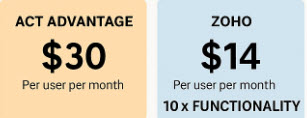 Several times a month I receive a call from an organization that has lost their ACT! password. Sometimes this happens when the ACT! Administrator leaves the company – and takes his password with him. Fortunately we are able to recover those passwords and send the new administrator on their way with the advice to have two administrative users in the future “just in case.”
Several times a month I receive a call from an organization that has lost their ACT! password. Sometimes this happens when the ACT! Administrator leaves the company – and takes his password with him. Fortunately we are able to recover those passwords and send the new administrator on their way with the advice to have two administrative users in the future “just in case.”
However, many times a single ACT! user calls lamenting that he can’t open his ACT! database because he has forgotten his password. I could charge the person to recover the password but, kind-hearted person that I am, I offer these tips that recover the password more often than not.
- A password error can mean that either your User Name or your Password is incorrect. And sometimes it can be both.
- Typically the user name is the users first and last name. However, sometimes it might be just your first name. All bets are off if you are a “Junior” and set up your user name as “John M. Smith, Jr.” as your user name must match perfectly to what you used down to the period and comma.
- The password is CASE sensitive, the user name is not.
- When prompted for your password, try leaving the password field blank. If you can’t remember your password chances are good that you never had one to begin with.
So why does this happen? Every ACT! database requires at least one user. And, if the database only has a single user without a password, you will not be prompted to officially “logon” to the database. However, if you add another user, upgrade to a newer version, restore a backup or move to a new computer you will have to supply your entire user name and password. And that password might be blank.
In other cases, users include a checkmark next to the Remember password option which means they were able to open and close their ACT! database hundreds of times without ever having to supply a password. Which leads me to wonder: what’s the point of assigning a password if anyone can access your confidential data by just clicking OK? Absence may make the heart grow fonder but it doesn’t do a whole lot for your memory. When you run into a situation where you’re required to cough up that password you may just find that you no longer remember what it is.
One finally tip: if you do assign a password to your database avoid using common ones such as password or 123456. These two passwords consistently rank as the most commonly used passwords year after year.
Still can’t access that database? We can help! Please reach out to Karen and we’ll send you the next steps.




Hi,
One of my Client need to recover ACT 2013 recover DB Password, would please let me know what would be the cost??
Regards,
Aasif
If you need help with password recovery please call Kim at 561-470-5450 x2.
I need help! I don’t remember my user ID and password for my ACT account and I need my admission ticket. I don’t remember my password for my yahoo mail neither. how can I get my ticket. I am taking the ACT test tomorrow!
forgot my password for act
Latoya, I’m so sorry I can’t help you. This site is dedicated to the ACT software program, not the A.C.T. college testing.
Hi Thomas, If you can’t resolve your password issue give up a call at 561-470-5450 x2 and we’ll do it for you. If you don’t remember using a password leave that field blank and try variations of your name: Thomas M Malloy, Thomas M. Malloy, tmalloy, etc.
I’ve been an ACT user since the early 90s. I retired in 2011 and no longer use ACT for business so it’s no longer worth my while (especially on a SS budget) to buy upgrades or pay the monthly fees for ACT cloud services. I have an old ACT Pro version which I know is no longer supported but which I can’t live without. My consultant in Colorado has also retired and I desperately need some help getting into my ACT. I inadvertently set a book on my key pad when my ACT was opening. It deleted a digit or two from my PWD. I have not had to insert the PWD in so many years, I have no idea what it is and now I can’t open my database. I have been backing up on a regular basis. Perhaps one of the back ups still has the full PWD but I don’t know how to un zip the file. Can you help me?
Alida, if you definitely lost your password then yes, we are able to recover it for you. We do charge $100 for the service.